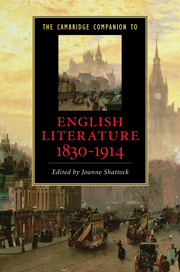10 - Body and mind
from Part II - Intersections and incursions
Published online by Cambridge University Press: 28 November 2010
Summary
There is no example of two agents so closely connected as body and mind … The entire bodily system, though in varying degrees, is in intimate alliance with mental functions.
Alexander Bain, Mind and Body, 1873A third of the way through Elizabeth Gaskell’s story 'A Dark Night’s Work', the heroine Ellinor Wilkins is suddenly roused from a pleasurable reverie by 'a mysterious noise - heavy, sudden' coming from her father’s study, giving rise to 'a mysterious instinct [which] made her feel sick and faint. No sound - no noise. Only by-and-by she heard, what we have all heard at such times of intense listening, the beating of the pulses of her heart, and then the whirling rush of blood through her head.' Creeping down the staircase, she sees, 'with a strange sick horror', the body of Dunster, her father’s unpleasant junior partner, 'his head propped on chair-cushions, his eyes open, staring, distended'. 'Ellinor could not have told whether it was reason or instinct that made her act as she did that fatal night', the narrator continues, describing how, almost in a state of trance, she first attempts to revive the dead man, then helps her father and their servant Dixon to bury Dunster’s body in the garden. This is the 'dark night’s work' that forms the climax of the tale - a 'haunting memory' that 'would come and overshadow her during many, many years of her life' (ch. 6).
'A Dark Night’s Work' was published in All the Year Round in 1863. Like Wilkie Collins, her fellow contributor to the journal, Gaskell often used short fiction as a means of generic experimentation, and her story shares many of the features of sensation fiction. It explores the effects of secrecy; it sets an extreme event in a familiar middle-class setting and exploits immediate physiological response to generate emotional intensity; and it traces the physical, emotional and social consequences of Dunster’s death on Wilkins, on Dixon and above all on Ellinor, as the mental shock of the murder itself becomes ‘the incubus of a dreadful remembrance’ (ch. 11).
- Type
- Chapter
- Information
- The Cambridge Companion to English Literature, 1830–1914 , pp. 184 - 204Publisher: Cambridge University PressPrint publication year: 2010
- 2
- Cited by

